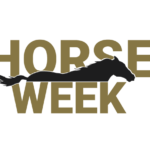Read award-winning journalist Nancy Jaffer’s latest report on the world of equestrian sport. Brought to you by Practical Horseman magazine. Visit Nancy’s archive for past columns.

October 1, 2008 (Updated October 6, 2008) — The drug test on Courtney King-Dye’s Olympic mount, Harmony’s Mythilus, which turned up positive for a prohibited substance, was a bolt from the blue–or more likely, from somewhere else.
The U.S. team had been scrupulous in its efforts to make sure the horses that went to Hong Kong for the Games were free of prohibited substances, and members of the Fédération Equestre Internationale (FEI) tribunal who heard Courtney’s case in September acknowledged that, as well as her “impeccable” record. But their hands were tied. Since no one could come up with an explanation of how the non-steroidal anti-inflammatory Felbinac got into Mythilus’ system, FEI rules demanded that the horse be disqualified. Courtney was, in FEI parlance, the Person Responsible.
Courtney’s expert testified that Mythilus had only 14 nanograms per milliliter of Felbinac in his system, while it would take 7,500 to 100,000 nanograms to have any palliative effect on a little rat. Yet such arguments were to no avail. There isn’t a threshold limit set on this drug to give leeway for the presence of even a trace, perhaps something picked up via environmental contamination. Meanwhile, ever-more-finely calibrated equipment can detect miniscule amounts of prohibited substances. Courtney was in a vise, an inadvertent victim of well-meaning efforts to keep the playing field level.
As part of the tribunal process, the U.S. team lost its fourth-place finish with Courtney’s disqualification, although Mythilus was not tested until he finished his performance in the individual finals, days after the horse’s appearance in the team finals as the lead-off entry for the U.S. effort. This year, the dressage competition was open only to squads of three riders, rather than the usual four, which meant there was no drop score and thus, no leeway. Disqualification of one rider meant elimination of an entire team. The fact that the drug in question was unfamiliar to Courtney and had others in the U.S. contingent scratching their heads made the whole thing even more puzzling.
Mythilus, Courtney surmised, could have picked up a trace of the drug from someone who had it on their hands before touching him. Felbinac is used in human medicine for arthritis, sprains, strains and similar ailments. But she couldn’t prove that or any other theories. Even the best precautions could not prevent the unforeseen.
This demoralizing situation illustrates the need for a change in how similar matters are handled in the future. The FEI tribunal that heard Courtney’s case could only let her off with time served on suspension after the Olympics, because the rule states that the punishment for a positive on a drug of this nature is elimination. Period.
The FEI is going to look at its drug rules after adjudication of the five other 2008 Olympic equine drug cases, all involving show jumpers that were positive for capsaicin. Should the rules be changed, and if so, how and why? The subject is something that requires a lot of deliberation.
But as a spokeswoman for the international governing body noted, “The principle of strict liability is at the heart of our rules, which state that ‘the Persons Responsible are responsible for any prohibited substance found to be present in their horse’s bodily samples. Accordingly, it is not necessary that intent, fault, negligence or knowing use on the Person Responsibles’ part be demonstrated in order to establish an anti-doping rule or medication control violation.’ This principle is the justification for the sanction as stated in the FEI Tribunal’s decision.”
In thinking about Courtney’s dilemma, remember that this isn’t like the headline-grabbing drug cases involving human athletes over the last four years.
“This is an innocent woman who got caught in a trap,” said U.S. Equestrian Federation CEO John Long.
His organization decided not to appeal the team disqualification to the Court of Arbitration for Sport, the same outfit that switched around the eventing medals after a controversy at the Athens Olympics four years ago.
“We stand behind the belief that the substance found its way into the horse from some kind of contamination,” he said, while adding that unfortunately, “there’s no way of knowing exactly when and where that happened. We don’t dispute the fact that there was Felbinac in Mythilus’ system, but it’s impossible for us to provide evidence about when and where it happened.”
With no more information than was aired at the original hearing, there wasn’t any point in going forward with an appeal.
“The rule doesn’t give you any leeway. If we had been able to ascertain how the substance entered into the horse, our decision may have been completely different. All we know is that it’s a substance they didn’t introduce into the horse.”
John believes this illustrates why the FEI should take a hard look at the drug rules.
“Rules of any kind always need to be reviewed. A rule that worked last year may not work this year,” he explained.

“In organizations like ours and the FEI, rules can’t be looked at as something that is just static. They’ve got to be continually reviewed and upgraded, especially in the area of drugs, medication and doping, where the science of detection changes, as well as the sophistication of the potential abusers. Just when you think you’ve got it right, someone comes up with a different way of doing it.
“It’s an obligation on our part and for all of the countries that participate internationally with the FEI to continue to test and learn what happened, so we can apply new logic to the rules, and in this situation, to make sure what happened to Courtney can never happen again.”
There is one big hole in the process, John believes.
“It seems to me that we have lost the input of the treating veterinarians in this discussion,” he said, adding that as a result, he doesn’t feel the horses and riders are being protected in the way they should.
The World Anti-Doping Agency, the watchdog of human doping in sport, “gives us guidance, but it’s not necessarily the language we should use.”
He also would like to see the tribunal have more leeway.
“To be fair, the tribunal’s hands were tied. I know several of the men on the tribunal. They are all bright, proper-thinking men,” he said. “I can’t help but think they would like to have the ability to use their reasoned judgment in a way they are frequently not permitted to do because of the inflexibility of the (rules’) language.”
That lack of flexibility, he said, “in some situations, maybe a lot of situations, dealing with doping and sport, that might make sense. In this situation, it doesn’t make any sense. It’s a difficult situation and hopefully we can assist the FEI in terms of thinking about ways in which rules and protocols can be written to make sure incidences like this don’t happen again.”
Will there be a ripple effect from the Mythilus scenario? After all the years of effort and sacrifice, Courtney’s first Olympic experience ended in a heartbreaking disqualification. Might others, looking at what she went through, decide that aspiring to a championship team simply isn’t worth it under these circumstances?
John believes this question underlines why it’s so important to take a hard look at the drug regulations.
“After this kind of settles down and the other cases are ruled upon…I think it would be absolutely important to sit around the table and debate the way in which the rules can be configured that does two things: Both guarantees attempts to make doping impossible (so) there’s no way a horse could be doped for the wrong sets of reasons, but still provides enough flexibility so in situations like Courtney’s, the tribunal has the opportunity to provide some common sense in its ruling.
“I think we can get there,” he contended, but warned, “If we don’t get there, it’s going to push people away from being involved in the Olympic Games.”
Courtney has a different viewpoint about the impact of her case.
“I don’t think it will discourage anybody; I hope it doesn’t discourage anybody,” Courtney said in an interview. “I just hope that it makes us all look at the possibilities that our current environment and our current testing capabilities may have to make sure we have the best possible rules for all given circumstances. I think everyone in the equestrian community agrees we need really strong drug laws. We stand by that, and if we don’t have that, then it’s terrible for the sport,” she insisted. “We just need to find the best way to do that without having to punish innocent people and innocent teams.”
Courtney’s teammate, Steffen Peters, sympathized with her, and was directly affected by the elimination of the team.
“I feel very bad for Courtney. That is a very unfortunate situation,” he said. “I wrote a recommendation letter (to the tribunal) for Courtney, saying it had to be some kind of accident caused by contamination. Courtney couldn’t control the situation that the team was eliminated, but this is something that we have to live with and we’ll go on from here.”
Steffen, who finished fourth individually with Ravel, added, “I support the FEI’s zero tolerance, I think that’s the way it should be, but they need to give the chance of contamination and accidents very careful thought. A contingency plan would be great.”
Courtney believes the tribunal was “trying to do the best they can for the sport. Hopefully something good will come out of it. I don’t want to make a big deal out of this. It was an innocent mistake. But we need to find a way to quietly figure out how this situation can be prevented again in the future.”
Courtney will continue to go for the gold, despite what happened in Hong Kong.
“It has not diminished my…passion at all. If I felt like somebody was to blame, it would be harder, but I felt like everyone was doing the best they could do,” she said. “I’m just caught in a bad situation, a mysterious situation. It’s just a weird thing.”
Comment on this column in the Practical Horseman forum.





